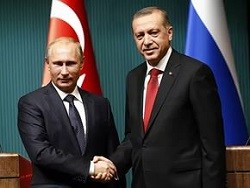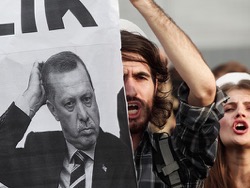The British establishment claims that the Turkish President is destroying democracy, which the Turks defended, risking their lives
 the <small>© Nana Yakovenko</small>
the <small>© Nana Yakovenko</small>
Nana Yakovenko
Edition of the Economist was puzzled by the complex Turkish subject and have dedicated a number of materials, written by leading experts. So, most observers here in London, I believe that the attempt of a military coup in Turkey on the night of July 15, much remains unclear, and too large number of unknown in this failed scenario. In particular, in one of the articles experts Economist in fact in Britain a practical and hardcode a number of questions: why it was organized so bad? As far as the conspiracy covered the tops? Was there a coup by supporters of a secular society, it appeared from their original statements? Or they were followers of the exiled Islamic preacher Fethullah Gulen (Muhammed Fethullah Gülen), as approved by the government?
Experts note, however, that several factors cannot be ignored, so they are obvious. First, the people of Turkey have shown fearlessness and courage out on the streets to confront the military. Killed hundreds of people. Even the opposition party, noted the authors of the articles, regardless of the degree of their negative attitude to the current President Recep Tayyip Erdogan (Recep Tayyip Erdogan) have joined forces in order to counter the threat hanging over the country. Lesser of two evils, in Turkey, prefer authoritarian ruler with an Islamic colouring, rather than the return to power of the generals, and, since 1960, for the fifth time!
The British activeout clear on the second factor and claim, in any case, it is obvious to those in London, thousands of kilometers away from Turkey, that Erdogan, like, rapidly destroys the democracy that people defended with their lives. As arguments, the experts list the following events that occurred after the coup: Turkey’s President declared a state of emergency, which will last at least three months. About 6 thousand military have been arrested; thousands of police, prosecutors and judges have been dismissed or deprived of office. The same fate befell the scientists, teachers and civil servants, although there is no clear evidence that they were involved in the coup. Proponents of a secular society, the Kurds and other minorities now intimidated by the procession through the streets of supporters of Recep Tayyip Erdogan. The authors of the Economist article remember a large-scale cleansing in Iraq after the overthrow of Hussein, that the United States was conducted with the aim of “de-Baathification” of the country. Then, in varying degrees, but equally dramatic, they have suffered at least 60 thousand people. The echoes of the violence we hear today.
And now British experts are quite serious and not very comforting conclusions: cleaning in Turkey go far beyond the security needs of the state. According to British experts, who reflect the mood of today’s political establishment in London, Erdogan had always identified dissent with treason, he says, and became the Director of his own coup, directed against freedom of opinion in Turkey. Unchecked, it will lead the country to more conflicts and chaos. In London sure that this Erdogan’s Turkey is a serious threat not only to its close neighbors, but for Europe and the West in General.
The experts of the Economist argue in the way that a failed coup could become the third shock to the European order established after 1989. In its reasoning the British, as English has already become a tradition kneaded, of course, and Russia. According to them, as they put it, “annexation” of Crimea and Russia’s invasion of Eastern Ukraine in 2014 has destroyed the view that borders in Europe are inviolable and that the cold war ended (though in this case, as usual, the British in “forgetfulness” do not remember about Yugoslavia, which the West began to redraw the boundaries). They note that the British euroreferendum clearly demonstrated that from this point the thesis of the irreversibility of integration in the European Union is divided. And based on the dramatic scenarios of recent years that we are seeing around the world, the Economist is a far-reaching conclusion. Analysts say the coup attempt in Turkey and the subsequent reaction of the authorities now put under serious doubt in General the postulate of the irreversibility of democracy in the Western world. In the world of democracy and the rule of law, to which Turkey, as it seemed, should join.
In London that all the recent events in Turkey are a threat to NATO — the military Alliance which “supports the democratic States of Europe.” Moreover, the British are puzzled by the fact that Turkey, according to them supposedly not having any evidence, accuses the US of involvement in the coup, demands to extradite living in Pennsylvania, gülen, and threatened to revise its relations with the West. The British say that if today was the question of Turkey’s membership in NATO, the country would be difficult to meet the standards of the Alliance. And that, experts say, is the biggest problem: the Alliance has no mechanisms to exclude the “guilty” member.
Having the second largest armed forces in NATO, Turkey has for many years been at the forefront of the defence of the West — first against the so-called Soviet totalitarianism, and then against chaos in the middle East. In the first years of government headed by Erdogan’s Party “Justice and Development” Turkey, according to Economust, was a model of a prosperous and stable Muslim countries: lined smooth relations with the Kurdish minority, has been successfully carried out socio-economic reforms that have resulted in tangible economic growth. Everything was going so well that in 2005, the EU began negotiations on Turkey’s accession to the Union.
However, after a series of events that began with protests in 2013. Erdogan began to roll, according to the British, to authoritarianism. And now he is seeking adoption of a new Constitution, which will expand the already infinitely wide powers of the President.
British experts continue to theoriesabout and argue that a more reasonable approach is the failure of the coup would be possible to wrap a last gasp of Turkish militarists. Erdogan could become a benevolent unifier of a divided nation that gave freedom of the press, has resumed peace talks with the Kurds and to build strong, independent democratic institutions. And instead become a leader with democratic values, as expressed by the experts, is on a par with the Arab despots. However, for some reason, these British experts say that family and close friends of the so-called “despots” are living in London, and their children receive education at home, in England.
Economist urges the West to take decisive action. Experts believe that the Western allies of Turkey should send Erdogan’s call to exercise restraint and to respect the laws. And people ask the logical question about what happens if the Turkish President does not listen to the West. Today Turkey is one of the key allies in the war against ISIS. The geopolitical position of Turkey allows it from the South-East to control the flow to Europe, ranging from natural gas and ending the Syrian refugees. A shame for the West is that, unfortunately, the geography of do not change. That’s why in London suggests that Europe can and must become less vulnerable. This, in their opinion, it is necessary to start with building a reliable system of control over the external borders of the EU. Furthermore, the British believe that, while today Erdogan has a trump card, and it is not protected from pressure. And as proof mention the fact that shortly before the coup, Erdogan began attempts to restore relations with Israel and Russia.
Experts Economist rightly pointed out that the Turkish economy, which was fundamentally the most important achievement of Erdogan today is the most vulnerable place of the President. Analysts say that in order to keep the economy of Turkey, the necessary inflow of foreign investments and loans. And this should convince foreign investors that the country is stable. But it is Erdogan going to be tough. According to the British, Erdogan’s behavior reminds them of a vengeful Sultan. Apparently the British, who have a huge experience of colonization and looting of the colonies, know better than anyone else.
Experts believe that consequences of a failed coup will reverberate for a very long time. They are right. The organizers of the coup killed many Turkish citizens, discredited the army and weakened its ability to defend the borders and to fight terrorists, rocked NATO and the pulled fuse inside the country.








